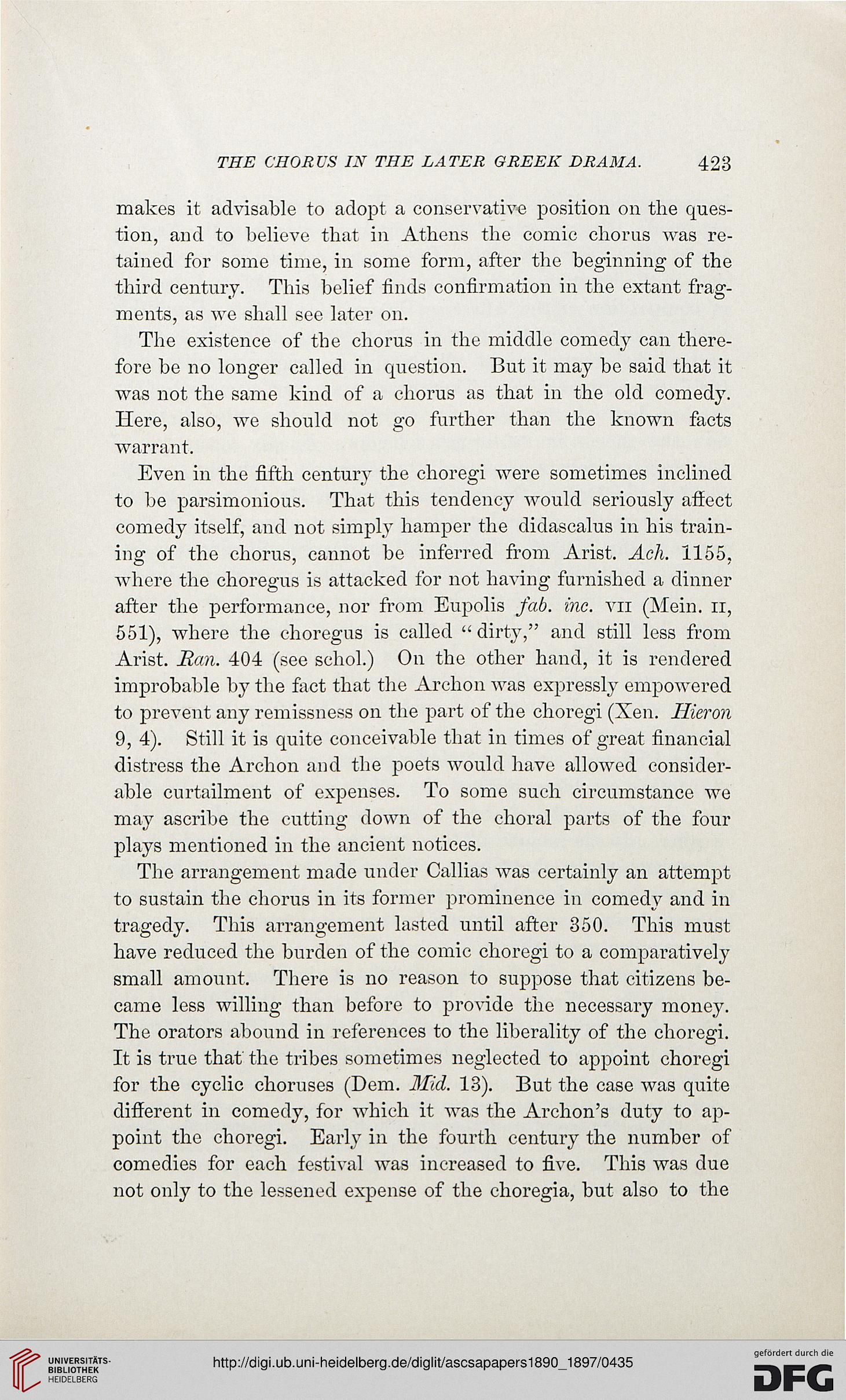THE CHORUS IN THE LATER GREEK DRAMA.
423
makes it advisable to adopt a conservative position on the ques-
tion, and to believe that in Athens the comic chorus was re-
tained for some time, in some form, after the beginning of the
third century. This belief finds confirmation in the extant frag-
ments, as we shall see later on.
The existence of the chorus in the middle comedy can there-
fore be no longer called in question. But it may be said that it
was not the same kind of a chorus as that in the old comedy.
Here, also, we should not go further than the known facts
warrant.
Even in the fifth century the choregi were sometimes inclined
to he parsimonious. That this tendency would seriously affect
comedy itself, and not simply hamper the didascalus in his train-
ing of the chorus, cannot be inferred from Arist. Ach. 1155,
where the choregus is attacked for not having furnished a dinner
after the performance, nor from Eupolis fab. inc. VII (Mein. n,
551), where the choregus is called " dirty," and still less from
Arist. Ban. 404 (see schol.) On the other hand, it is rendered
improbable by the fact that the Archon was expressly empowered
to prevent any remissness on the part of the choregi (Xen. Hieron
9, 4). Still it is quite conceivable that in times of great financial
distress the Archon and the poets would have allowed consider-
able curtailment of expenses. To some such circumstance we
may ascribe the cutting down of the choral parts of the four
plays mentioned in the ancient notices.
The arrangement made under Callias was certainly an attempt
to sustain the chorus in its former prominence in comedy and in
tragedy. This arrangement lasted until after 350. This must
have reduced the burden of the comic choregi to a comparatively
small amount. There is no reason to suppose that citizens be-
came less willing than before to provide the necessary money.
The orators abound in references to the liberality of the choregi.
It is true that the tribes sometimes neglected to appoint choregi
for the cyclic choruses (Dem. Mid. 13). But the case was quite
different in comedy, for which it was the Archon's duty to ap-
point the choregi. Early in the fourth century the number of
comedies for each festival was increased to five. This was due
not only to the lessened expense of the choregia, but also to the
423
makes it advisable to adopt a conservative position on the ques-
tion, and to believe that in Athens the comic chorus was re-
tained for some time, in some form, after the beginning of the
third century. This belief finds confirmation in the extant frag-
ments, as we shall see later on.
The existence of the chorus in the middle comedy can there-
fore be no longer called in question. But it may be said that it
was not the same kind of a chorus as that in the old comedy.
Here, also, we should not go further than the known facts
warrant.
Even in the fifth century the choregi were sometimes inclined
to he parsimonious. That this tendency would seriously affect
comedy itself, and not simply hamper the didascalus in his train-
ing of the chorus, cannot be inferred from Arist. Ach. 1155,
where the choregus is attacked for not having furnished a dinner
after the performance, nor from Eupolis fab. inc. VII (Mein. n,
551), where the choregus is called " dirty," and still less from
Arist. Ban. 404 (see schol.) On the other hand, it is rendered
improbable by the fact that the Archon was expressly empowered
to prevent any remissness on the part of the choregi (Xen. Hieron
9, 4). Still it is quite conceivable that in times of great financial
distress the Archon and the poets would have allowed consider-
able curtailment of expenses. To some such circumstance we
may ascribe the cutting down of the choral parts of the four
plays mentioned in the ancient notices.
The arrangement made under Callias was certainly an attempt
to sustain the chorus in its former prominence in comedy and in
tragedy. This arrangement lasted until after 350. This must
have reduced the burden of the comic choregi to a comparatively
small amount. There is no reason to suppose that citizens be-
came less willing than before to provide the necessary money.
The orators abound in references to the liberality of the choregi.
It is true that the tribes sometimes neglected to appoint choregi
for the cyclic choruses (Dem. Mid. 13). But the case was quite
different in comedy, for which it was the Archon's duty to ap-
point the choregi. Early in the fourth century the number of
comedies for each festival was increased to five. This was due
not only to the lessened expense of the choregia, but also to the




